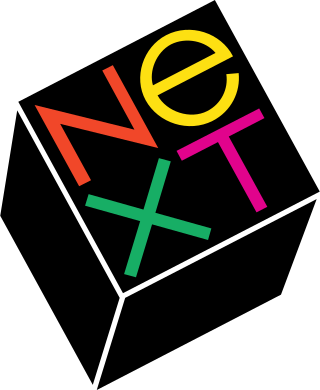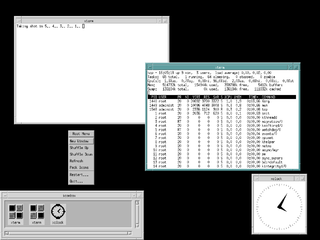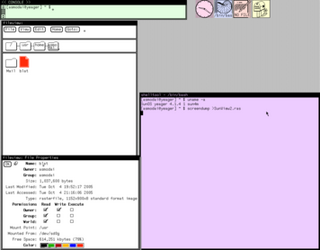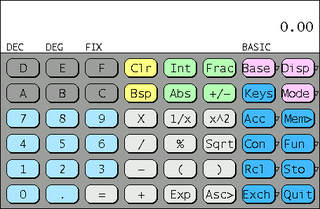
NeXTSTEP is a discontinued object-oriented, multitasking operating system based on the Mach kernel and the UNIX-derived BSD. It was developed by NeXT Computer in the late 1980s and early 1990s and was initially used for its range of proprietary workstation computers such as the NeXTcube. It was later ported to several other computer architectures.

OpenStep is a defunct object-oriented application programming interface (API) specification for a legacy object-oriented operating system, with the basic goal of offering a NeXTSTEP-like environment on non-NeXTSTEP operating systems. OpenStep was principally developed by NeXT with Sun Microsystems, to allow advanced application development on Sun's operating systems, specifically Solaris. NeXT produced a version of OpenStep for its own Mach-based Unix, stylized as OPENSTEP, as well as a version for Windows NT. The software libraries that shipped with OPENSTEP are a superset of the original OpenStep specification, including many features from the original NeXTSTEP.

NeWS is a discontinued windowing system developed by Sun Microsystems in the mid-1980s. Originally known as "SunDew", its primary authors were James Gosling and David S. H. Rosenthal. The NeWS interpreter was based on PostScript extending it to allow interaction and multiple "contexts" to support windows. Like PostScript, NeWS could be used as a complete programming language, but unlike PostScript, NeWS could be used to make complete interactive programs with mouse support and a GUI.

In computing, Motif refers to both a graphical user interface (GUI) specification and the widget toolkit for building applications that follow that specification under the X Window System on Unix and Unix-like operating systems. The Motif look and feel is distinguished by its use of rudimentary square and chiseled three-dimensional effects for its various user interface elements.

Swing is a GUI widget toolkit for Java. It is part of Oracle's Java Foundation Classes (JFC) – an API for providing a graphical user interface (GUI) for Java programs.

OPEN LOOK is a graphical user interface (GUI) specification for UNIX workstations. It was originally defined in the late 1980s by Sun Microsystems and AT&T Corporation.
MoOLIT is a graphical user interface library and application programming interface (API) created by Unix System Laboratories in an attempt to create a bridge between the two competing look-and-feels for Unix workstations at the time: OPEN LOOK and OSF Motif.

The Standard Widget Toolkit (SWT) is a graphical widget toolkit for use with the Java platform. It was originally developed by Stephen Northover at IBM and is now maintained by the Eclipse Foundation in tandem with the Eclipse IDE. It is an alternative to the Abstract Window Toolkit (AWT) and Swing Java graphical user interface (GUI) toolkits provided by Sun Microsystems as part of the Java Platform, Standard Edition (J2SE).
The Java Foundation Classes (JFC) are a graphical framework for building portable Java-based graphical user interfaces (GUIs). JFC consists of the Abstract Window Toolkit (AWT), Swing and Java 2D. Together, they provide a consistent user interface for Java programs, regardless of whether the underlying user interface system is Windows, macOS or Linux.
Distributed Objects Everywhere (DOE) was a long-running Sun Microsystems project to build a distributed computing environment based on the CORBA system in the 'back end' and OpenStep as the user interface. First started in 1990 and announced soon thereafter, it remained vaporware for many years before it was finally released as NEO in 1995. It was sold for only a short period before being dropped in 1996. In its place is what is today known as Enterprise JavaBeans.
In computing, the X Window System is a network-transparent windowing system for bitmap displays. This article details the protocols and technical structure of X11.

X Toolkit Intrinsics is a library that implements an API to facilitate the development of programs with a graphical user interface (GUI) for the X Window System. It can be used in the C or C++ languages.

SunView is a discontinued windowing system from Sun Microsystems that was included as part of its UNIX implementation starting in 1983. Unlike later UNIX windowing systems, much of it was implemented in the system kernel. SunView ran on Sun's desktop and deskside workstations, providing an interactive graphical environment for technical computing, document publishing, medical, and other applications of the 1980s, on high resolution monochrome, greyscale and color displays.

XView is a widget toolkit from Sun Microsystems introduced in 1988. It provides an OPEN LOOK user interface for X Window System applications, with an object-oriented application programming interface (API) for the C programming language. Its interface, controls, and layouts are very close to that of the earlier SunView window system, making it easy to convert existing applications from SunView to X. Sun also produced the User Interface Toolkit (UIT), a C++ API to XView.

OpenWindows is a discontinued desktop environment for Sun Microsystems workstations which combined a display server supporting the X Window System protocol, the XView and OLIT toolkits, the OPEN LOOK Window Manager (olwm), and the DeskSet productivity tools; earlier versions of OpenWindows also supported the NeWS protcol. It implements the OPEN LOOK GUI specification.

Xlib is an X Window System protocol client library written in the C programming language. It contains functions for interacting with an X server. These functions allow programmers to write programs without knowing the details of the X protocol.

X Athena Widgets or Xaw is a GUI widget library for the X Window System. Developed as part of Project Athena, Xaw was written under the auspices of the MIT X Consortium as a sample widget set built on X Toolkit Intrinsics (Xt); Xt and Xaw are collectively known as the X Toolkit. Xaw has been largely superseded by more sophisticated toolkits like Motif, and later toolkits such as GTK, and Qt, but it is still maintained and is available as part of most X Window System installations. The library, like other core parts of X, is licensed under the MIT License.
Pluggable look and feel is a mechanism used in the Java Swing widget toolkit allowing to change the look and feel of the graphical user interface at runtime.

The Abstract Window Toolkit (AWT) is Java's original platform-dependent windowing, graphics, and user-interface widget toolkit, preceding Swing. The AWT is part of the Java Foundation Classes (JFC) — the standard API for providing a graphical user interface (GUI) for Java program. AWT is also the GUI toolkit for a number of Java ME profiles. For example, Connected Device Configuration profiles require Java runtimes on mobile telephones to support the Abstract Window Toolkit.













